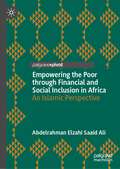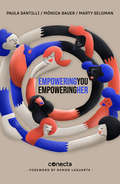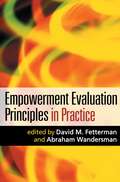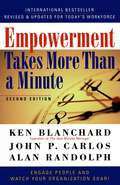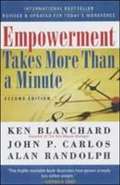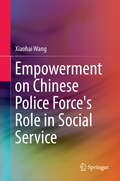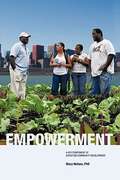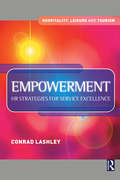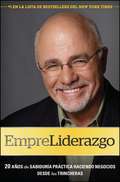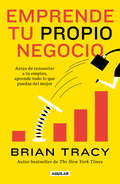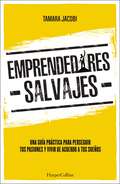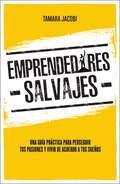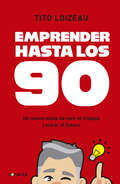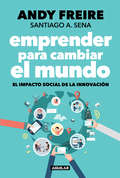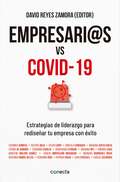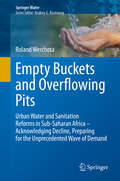- Table View
- List View
Empowering the Poor through Financial and Social Inclusion in Africa: An Islamic Perspective
by Abdelrahman Elzahi Saaid AliThis book discusses financial inclusion, gender equality, regulatory regimes for microfinance, women empowerment, and digital finance from an Islamic perspective. It encourages the reader to reflect on whether the delivery of financial services from an Islamic perspective might be attainable and lead to achieving global financial inclusion. Accessing financing is one of the most formidable challenges facing disadvantaged in IsDB member countries. The race to serve these niche markets has led to the emergence of conventional microfinance. There remains the lingering question of whether conventional microfinance in its current form has conclusively led to poverty alleviation among Muslim communities. Hence, there is a need of having Shari’ah-compliant business model that depends on Islamic socio-economic tools such as Zakah, Sadaqah, and Waqf might best address the needs self-financial exclusion or the exclusion of the extremely poor in Muslim.
Empowering you, empowering her
by Marty Seldman Paula Santilli Mónica BauerLet’s be a force that brings development and equality to women worldwide by helping them realize their professional goals! Women’s economic power is critical to the pressing recovery of the global economy. PepsiCo’s LatAm executives Paula Santilli and Mónica Bauer, together with business coach Marty Seldman, know that unleashing that power is not easy—women today face many challenges in their social, economic, and work environments. This is why with this book they aim to raise women’s self-confidence, by giving them the necessary tools to stimulate their personal and professional development. Their twelve rules will unlock women’s full potential by helping women better understand their power, feel comfortable using it, and not give it away. The Twelve Rules Study power Detect to protect Use your power; don’t give it away Build and leverage your network Know your buzz Focus on the real scorecard Promote yourself with sufficient boldness Increase your value to the organization Enhance your executive presence Protect yourself from sabotage and marginalization Develop healthy selfishness Control your calendar and commitments The rules are illustrated by inspiring stories from PepsiCo women associates all across the globe who have put these rules into practice. Prompts and activities help readers immediately start applying the rules to their current situation. The goal is not only to inspire women to reach their potential but also to empower other women along the way.
Empowerment Effort That Came Undone (HBR Case and Commentary)
by J. Richard Hackman Lawrence R. Rothstein Mary V. Gelinas Elios Pascual W. Alan Randolph Roger G. JamesGeorge Marlow, a manufacturing vice president at SportsGear, had been looking forward to this month's companywide meeting. Martin Griffin, SportsGear's CEO, was going to announce a new era of empowerment at the company. And as Martin gave his speech, he seemed to fill the entire auditorium with his enthusiasm. But Harry Lewis, a SportsGear veteran of more than 20 years, was not so sure. "What in the world does empowerment mean?" he asked. And indeed, Harry's concerns proved well founded. George led the team from manufacturing that was to be the test case for implementing empowerment at SportsGear. The team began the project in high spirits, eager to accomplish its goals. But when the time came to present their reports, the members were shocked: Martin was called away from the meeting, and the department heads formed a wall of resistance. It appeared that the team's efforts had been a waste of time. Can empowerment work at SportsGear? In 95111 and 95111Z, J. Richard Hackman, Elios Pascual, Mary V. Gelinas, Roger G. James, and W. Alan Randolph offer advice on this fictional case study.
Empowerment Evaluation Principles in Practice
by David FettermanWhat principles should guide an empowerment evaluation? And how can these principles actually be put into practice? One of the primary tasks in an empowerment evaluation (EE) is to increase the capacity of program stakeholders to plan, implement, and evaluate their own programs. This book presents the most current formulation of the 10 principles of EE and provides professionals and students with the tools to put these principles into practice. Through case studies of diverse evaluation projects--including community health foundation initiatives, school district programs, and a $15 million corporate program aimed at bridging the digital divide--the founder and leading proponents of EE clarify key concepts and discuss important lessons learned. Coverage includes how to balance program improvement efforts with accountability requirements; how EE can be used to guide standards-based work; how to use EE in a learning organization; the differences among empowerment, collaborative, and participatory evaluation; and much more.
Empowerment Takes More Than a Minute: Second Edition
by Ken Blanchard Alan Randolph John P. CarlosIn the newly updated edition of this classic empowerment business fable—over 400,000 copies sold—Ken Blanchard and John Carlos show you how to shift to an empowered, employee-driven work environment. Empowerment Takes More Than a Minute tells the story of a young manager whose attempts to turn his troubled company around through traditional top-down, command-and-control management are failing. Reluctantly, he contacts an expert in empowerment, even though he feels like he's already tried that approach. Step by step, the expert helps him understand why his past and present efforts have fallen short and figure out what he needs to do to create an empowered workforce. The process as it unfolds is complex, paradoxical, and counterintuitive—but well worth the effort. This new edition dispels the notion that empowerment is a bygone fad. No matter what its name, the essential concept—that organizations can achieve extraordinary results by recognizing and taking advantage of the skills, experience, and knowledge already existing in the organization—will always be relevant. Although sometimes arduous, the journey to empowerment is well worth embarking on. In fact, unleashing the power of people in an organization may be the only way to continue to do business in a competitive, complicated marketplace.
Empowerment Takes More than a Minute
by Ken Blanchard Alan Randolph John P. Carlos"In this new edition of one of the most effective business fables ever written, coauthors Blanchard, Carlos and Randolph illustrate three keys that you can use to create a culture of empowerment that truly works..."-Back Cover
Empowerment Through Agency Enhancement: An Interdisciplinary Exploration
by Mine Sato Nobuo Sayanagi Toru YanagiharaThis book focuses on the understanding of factors and mechanisms involved in the development of agency mainly in three related contexts --- participatory development, extension work, and service transactions. The research has its starting point in the recognition of the critical role played by “agency” (commonly understood as want/will for and practice of self-determination and self-management) on the part of intended beneficiaries of services and projects for effective implementation and sustainability. It is designed to address this subject matter with its principal focus on inner capacities and orientations of human beings, posing questions as to how such capacities and orientations could be enhanced and activated in practice by external actors in the field of public policies for socioeconomic and international development. The project is organized transcending traditional disciplinary boundaries --- combining anthropological, psychological, and economic approaches and perspectives.
Empowerment on Chinese Police Force's Role in Social Service
by Xiaohai WangThis is the first scholarly book to explore the empowerment and the social service role of frontline police officers in the People's Republic of China. It approaches the study of role strain and empowerment, informed by local empirical data and personal experience. Thematically organized and focusing on those issues of greatest concern to the public, such as the dual social control (informal and formal) mechanism, mass line policing, strike-hard campaigns, police professionalization and professional ethics, as well as the paramilitary-bureaucratic structure in the Chinese police organization, it provides a detailed discussion of these and other contemporary issues. The book offers a valuable resource for students and researchers in the area of comparative policing and comparative criminal justice, as well as police professionals and policy-makers.
Empowerment von Mitarbeitern und Teams in Organisationen: Ein systemischer Ansatz (essentials)
by Marion WillemsMarion Willems stellt in diesem essential dar, wie man Mitarbeiter und Teams in Organisationen mit systemischem Coaching empowern (befähigen) kann, so dass sie gleichzeitig für die Ziele des Teams arbeiten und auch selbstwirksam ihre eigenen Ziele verfolgen können. So werden ein Rahmenwerk für Empowerment sowie partizipative Organisationsmethoden und -strukturen im Rahmen einer strukturierten Vorgehensweise vorgestellt, mit denen Führungskräfte, Personaler, Teamleader, Gründer, Change Manager und Coaches Empowerment in ihrer Organisation von Anfang an einleiten und ermöglichen können. Gleichzeitig können Führungskräfte mit hilfreichen systemischen und agilen Tools und Methoden ihr Führungsinstrumentarium erweitern und dieses direkt in der Praxis umsetzen.
Empowerment: A Key Component of Christian Community Development
by Mary NelsonThe way we as Christians attempt to restore communities can be either harmful or helpful. The purpose of this book on Empowerment is to move us toward more effective involvement and empowerment with the poor. Leaders will learn to see our under-resourced communities and their residents through a new set of eyeglasses; focusing more on developing people's skills and capacities, rather than simply helping the poor live better lives. Empowerment is one of Eight Key Components of Christian Community Development, a Biblical approach to restoring under-resourced communities.
Empowerment: Hr Strategies For Service Excellence (Hospitality, Leisure And Tourism Ser.)
by Conrad Lashley'Empowerment: HR strategies for service excellence' shows managers and students the importance of empowerment as part of human resource strategy. It provides a critical perspective of this established vital management technique, identifying factors that will lead to a win: win situation for all concerned. When successfully incorporated as part of HR strategy, empowerment can:* enable organizations to gain commercial and competitive advantage* become more flexible* improve employee commitment* use the skills of individual employees to best advantage and enhance personal capabilities.'Empowerment: HR strategies for service excellence' uses case studies from companies such as McDonalds, TGI Fridays and Harvester Restaurants to build a picture of empowerment of service employees in context, illustrating how different forms of empowerment are employed and different working arrangements are practiced.
Empowerment: The Emperor's New Clothes
by Chris ArgyrisEveryone talks about empowerment, but it's not working. CEOs subtly undermine empowerment. Employees are often unprepared or unwilling to assume the new responsibilities it entails. Even change professionals stifle it. When empowerment is used as the ultimate criteria of success in organizations, it covers up many of the deeper problems that they must overcome. To understand this apparent contradiction, author Chris Argyris (Harvard Business School Professor Emeritus and Director at Monitor Co.) explores two kinds of commitment: external and internal. External commitment--or contractual compliance--is what employees display when they have little control over their destinies and are accustomed to working under the command-and-control model. Internal commitment occurs when employees are committed to a particular project, person, or program for their own individual reasons or motivations. Internal commitment is very closely allied with empowerment. The problem with change programs designed to encourage empowerment is that they actually end up creating more external than internal commitment. One reason is that these programs are rife with inner contradictions and send out mixed messages like "do your own thing--the way we tell you." The result is that employees feel little responsibility for the change program, and people throughout the organization feel less empowered. What can be done? Companies would do well to recognize potential inconsistencies in their change programs; to understand that empowerment has its limits; to establish working conditions that encourage employees' internal commitment; and to realize that morale and even empowerment are penultimate criteria in organizations. The ultimate goal is performance.
EmpreLiderazgo: 20 Años De Sabiduría Práctica Haciendo Negocios Desde Las Trincheras
by Dave RamseyA Simon & Schuster eBook trincheras a lo largo de más de veinte años y que le servirán para que lidere con confianza y seguridad.
Emprende tu propio negocio: Antes de renunciar a tu empleo, aprende todo lo que puedas del mejor
by Brian Tracy"Un camino directo hacia el éxito empresarial para principiantes... Los futuros emprendedores se beneficiarán de las estrategias sencillas de Brian Tracy." Kirkus Review En esta era empresarial es muy tentador dejar tu trabajo para empezar tu propio negocio. En Emprende tu propio negocio el mundialmente conocido autor bestseller y consultor de negocios Brian Tracy habla de una de las habilidades más necesarias hoy en día, el espíritu empresarial, abordando importantes temas como: -Los mitos de la iniciativa empresarial. -La mejor opción de negocio para ti. -Las opciones de financiamiento para tu negocio. -La estructura de un plan de negocios realista. -Las claves para construir el mejor equipo. -Las herramientas para crecer tu negocio con ventas y marketing. Este libro está diseñado para ayudar a cualquiera que quiera empezar o hacer crecer un negocio. Si aplicas las ideas de Brian Tracy, ¡tú también podrás convertirte en un emprendedor exitoso!
Emprendedores Salvajes
by Tamara JacobiTamara Jacobi comparte sus ideas sobre lo que se necesita para dar el salto con éxito.Ilustra cómo guías de surf, constructores de esquí, instructores de yoga y bienestar, activistas ambientales, amantes de la naturaleza, food trucks, podcasters, artesanos y otros creativos logran un estilo de vida aventurero y viabilidad financiera cuando se atreven a abrazar su espíritu libre y convertirse en empresarios salvajes!Jacobi comparte las lecciones que ha aprendido como empresaria, junto con las historias y la sabiduría de otros Emprendedores Salvajes, revelando las alegrías y las realidades de hacer realidad sus sueños comerciales.Esta guía salvaje, será una herramienta eficaz para iniciar y administrar un negocio no convencional. Una oportunidad para ir más allá del miedo, cobrar vida y sintonizarse con la inspiración mientras se gana la vida, y comienza a vivir la vida de sus sueños.Tamara Jacobi shares his ideas about what it takes to make the jump successfully.Illustrate how surf guides, ski builders, yoga and wellness instructors, environmental activists, nature lovers, food trucks, podcasters, artisans and other creatives achieve an adventurous lifestyle and financial viability when they dare to embrace their free spirit and become wild entrepreneurs!Jacobi shares the lessons she has learned as a businesswoman, along with the stories and wisdom of other Wildentrepreneurs, revealing the joys and realities of making her business dreams come true.This wild guide will be an effective tool to start and manage an unconventional business. An opportunity to go beyond fear, come alive and tune in to inspiration while making a living, and start living the life of your dreams.
Emprendedores Salvajes
by Thomas NelsonTamara Jacobi comparte sus ideas sobre lo que se necesita para dar el salto con éxito.Ilustra cómo guías de surf, constructores de esquí, instructores de yoga y bienestar, activistas ambientales, amantes de la naturaleza, food trucks, podcasters, artesanos y otros creativos logran un estilo de vida aventurero y viabilidad financiera cuando se atreven a abrazar su espíritu libre y convertirse en empresarios salvajes!Jacobi comparte las lecciones que ha aprendido como empresaria, junto con las historias y la sabiduría de otros Emprendedores Salvajes, revelando las alegrías y las realidades de hacer realidad sus sueños comerciales.Esta guía salvaje, será una herramienta eficaz para iniciar y administrar un negocio no convencional. Una oportunidad para ir más allá del miedo, cobrar vida y sintonizarse con la inspiración mientras se gana la vida, y comienza a vivir la vida de sus sueños.Tamara Jacobi shares his ideas about what it takes to make the jump successfully.Illustrate how surf guides, ski builders, yoga and wellness instructors, environmental activists, nature lovers, food trucks, podcasters, artisans and other creatives achieve an adventurous lifestyle and financial viability when they dare to embrace their free spirit and become wild entrepreneurs!Jacobi shares the lessons she has learned as a businesswoman, along with the stories and wisdom of other Wildentrepreneurs, revealing the joys and realities of making her business dreams come true.This wild guide will be an effective tool to start and manage an unconventional business. An opportunity to go beyond fear, come alive and tune in to inspiration while making a living, and start living the life of your dreams.
Emprender hasta los 90: Un nuevo modo de vivir el trabajo y mirar el futuro
by Tito LoizeauTrabajar durante veinte o treinta años y disfrutar de todo ese esfuerzo luego de la jubilación ya no parece una opción atractiva. Tito Loizeau, reconocido emprendedor argentino, propone en Emprender hasta los 90 una novedosa alternativa: organizar la vida laboral para intercalar momentos de placer mientras seguimos con la rutina y las obligaciones. Trabajar durante veinte o treinta años para disfrutar de todo ese esfuerzo luego de la jubilación ya no parece resultar una opción atractiva. Tito Loizeau, reconocido emprendedor argentino, presenta una novedosa alternativa: organizar la vida laboral de manera tal que podamos intercalar momentos de placer mientras seguimos con la rutina y las obligaciones. ¿Cómo lograrlo? "Mi propuesta es mostrarles otro camino posible. Un camino de equilibrio en el que la invitación es seguir trabajando toda la vida, pero, a cambio, disfrutar de tiempo con amigos, familia y con uno mismo. No dejar para el retiro los momentos de disfrute", dice el autor. Volcando su propia experiencia, con didáctica y claridad, Loizeau desarrolla "seis ingredientes" que integran la fórmula para alcanzar este nuevo paradigma que nos ayudará a vivir el trabajo y mirar hacia el futuro de otra manera. En definitiva, Emprender hasta los 90 es una verdadera oportunidad para cambiar en serio. Tito Loizeau, emprendedor desde los 22 años cuando realizó su primer emprendimiento, cuenta con una gran experiencia: fundó una cadena de cines en el interior del país y una fábrica de sillones, con las que fracasó. Creó Promored, que arrancó como portal de cupones de descuento y se convirtió en una agencia de marketing digital con presencia en quince países y más de cinco mil promociones para marcas como Pepsico, Unilever, Nestlé, Mondelez/Kraft Foods, LG y Philips, entre otras. En 2007 abrió el primer Barbie Store del mundo y en 2011 fundó CienPies, empresa de desarrollo de contenidos infantiles, productores de ZTV para Telefé y socia de la producción de Bubba y sus amigos, que se emite en Disney Junior y en Netflix. En 2015 creó Caramba!, agencia de marketing promocional. Fue seleccionado emprendedor Endeavor en el año 2000, y actualmente es miembro de dicha fundación. Desde el 2011 es vicepresidente de la Fundación Discar, ONG dedicada a la inclusión social y laboral de jóvenes con discapacidad mental.
Emprender para cambiar el mundo: El impacto social de la innovación
by Andy Freire Santiago A. SenaAndy Freire con Santiago A. Sena nos presentan a los emprendedores sociales, quienes demuestran que el impacto social y la sostenibilidad económica no son lógicas contrapuestas, sino una alianza innovadora que cambia paradigmas en todo el mundo. Mientras el futuro aparece amenazante (la pérdida masiva de empleo por la automatización, el calentamiento global y las crisis humanitarias), estos emprendedores traen respuestas: generar un impacto social positivo y sustentable desde empresas que proveen bienes y servicios, tienen clientes, generan ganancias, son rentables y, al mismo tiempo, solucionan problemas sociales concretos. Su experiencia deja en claro que hay una nueva forma de encarar la vida laboral. El capitalismo puede ser salvaje, pero los emprendedores sociales se comprometen a domarlo y humanizarlo en beneficio de la sociedad.
Empresa regenerativa. Optimizarse para la abundancia multicapital
by Ethan Roland Gregory Landua Noelia JiménezYa no es aceptable generar beneficios económicos extrayendo la riqueza viva fundamental de nuestras tierras y aguas. Las empresas necesitan un nuevo modelo con el que interpretar el mundo y un nuevo proceso para el diseño de sistemas integrales y la toma de decisiones. 8 formas de capital es ese modelo. Al articular las múltiples formas de capital con las que realizamos transacciones cada día, se abre la puerta a un enfoque evolutivo de la economía y los beneficios. Nuestro nuevo libro Empresa regenerativa define la diferencia entre los sistemas degenerativos, sostenibles y regenerativos y articula los cuatro factores de una empresa regenerativa así como los principios para diseñar ecologías de empresas regenerativas.
Empresari@s vs. COVID-19: Estrategias de liderazgo para rediseñar tu empresa con éxito
by David Reyes ZamoraDieciocho figuras de primer nivel en el mundo empresarial reflexionan sobre el Perú que nos espera después de la pandemia. Se trata de profesionales cuya experiencia, liderazgo y responsabilidad pueden influir decisivamente en la reactivación económica y el desarrollo equilibrado del país. Coordinado y editado por el periodista David Reyes Zamora, Empresari@s vs. COVID-19 resulta una guía indispensable para afrontar la crisis, mediante diversas propuestas que parten de una visión de empresa orientada a crear una sociedad peruana más justa, inclusiva y equitativa.
Empresarios oprimidos
by Gabriel ZaidHacen falta empresarios creadores de empresarios. Que separen sus operaciones separables. Que favorezcan el desarrollo, no a la absorción o estrangulación, de proveedores y contratistas. Que vendan todo lo que hace falta para la producción de buena calidad en pequeña escala. En la crisis actual los empresarios se encuentran ante una oportunidad extraordinaria para multiplicarse y mostrar lo que realmente pueden hacer por la sociedad. "Un puesto de tacos le conviene más al país que un puesto burocrático, pero los altos funcionarios suponen que sus propios empleos son el modelo al que aspira la humanidad. Sus buenas intenciones perpetúan la pobreza. Muchos anhelos de justicia han pintado a los pobres como asalariados oprimidos por empresarios desalmados. Son más bien empresarios oprimidos por asalariados bien intencionados que no saben verlos ni apoyarlos como empresarios. Desafiando las ideas empleocéntricas convencionales, Zaid ve la solución en los pobres como empresarios." Enrique Krauze "De los ensayistas mexicanos que escriben sobre el desarrollo, Gabriel Zaid tiene el ojo más certero y el punto de vista más fresco. Ecléctico y pragmático, descarta la ideología para concentrarse en las ideas que funcionen y ofrezcan una esperanza razonable de mejoría social o económica." Martin S. Staab, The dissenting voice: The new essay of Spanish America, 1960-1985 Esta nueva versión de Hacen falta empresarios creadores de empresarios conserva 23 capítulos y añade 33, todos revisados.
Empress of Fashion: A Life of Diana Vreeland
by Amanda Mackenzie Stuart“The first comprehensive bio of legendary magazine editor Diana Vreeland is a can’t-put-down read.” —PeopleFrom her career at the helms of Harper’s Bazaar and Vogue to her reign as consultant to the Costume Institute at the Metropolitan Museum of Art, Vreeland had an enormous impact on the fashion world and left a legacy so enduring that must-have style guides still quote her often-wild and always-relevant fashion pronouncements.With access to Vreeland’s personal material and photographs, Amanda Mackenzie Stuart has written the definitive behind-the-scenes look at the woman and her world—a jet-setting social scene that included Coco Chanel, Elsa Schiaparelli, Yves Saint Laurent, Hubert de Givenchy, Oscar de la Renta, Lauren Bacall, Penelope Tree, Lauren Hutton, Andy Warhol, Mick and Bianca Jagger, and the Kennedys. Filled with gorgeous color photographs of her work, Empress of Fashion is an intimate, surprising look at “the imperious, mesmerizing virtuoso who wandered onto the fashion stage and stole the show.” (New York Daily News).“Dazzlingly comprehensive, perceptive and many-sided.” —The New York Times Book Review“Stands out for its un-gushy, arm’s-length observation of a woman who used any means possible—including outrageous lies—to create the mise en scène for her life.” —The Wall Street Journal“A nuanced portrait of a strange and tantalizing woman.” —Daily Beast
Emprunter de l'argent: ...et éviter les usuriers! (Comment faire... #92)
by Owen JonesJ'espere que vous trouverez les articles utiles et profitables.Les informatrions contenues dans ce livre numerique sur la facon d'obtenir les meilleurs offres en matière d'emprunt d'argent et sur des sujets connexes sont organisées en 17 chapitres d'environ 500 à 600 mots chacun. Il vous aidera à ameliorer votre approche du financement et des prets grâces à des conseils et des suggestions utiles . Cela devrait également vous donner des idées sur la facon d'ameliorer les méthodes que vous utilisez deja. En prime je vous autorise à utiliser le contenu sur votre web ou dans vos propres blogs et newsletter , meme s'il est préférable que vous les réecriviez dans vos propres mots.
Empty Breadbasket? The Coming Challenge to America's Food Supply and What We Can Do About It
by The Cornucopia Project of Rodale PressThe massive U.S. food supply which provides us with almost any food we want-at any time of year-is surprisingly fragile. Without a change in directions there will be a depletion of natural resources: soil, water, energy. This book is a result of the study conducted by the Cornucopia Project of Rodale Press to document the vulnerability, and suggest how consumers, farmers and food industry can improve.
Empty Buckets and Overflowing Pits: Urban Water and Sanitation Reforms in Sub-Saharan Africa – Acknowledging Decline, Preparing for the Unprecedented Wave of Demand (Springer Water)
by Roland WerchotaThis book provides a multi-level and multi-dimensional insight into urban water and sanitation development by analyzing sector reforms in Africa. With the recent events in mind - water shortages in Cape Town, widespread cholera in Haiti, mass-migration from low-income countries, etc. – it elaborates a pressing topic which is directly linked to the precarious living conditions of the urban poor in the developing countries. It is urgent to acknowledge the proposed findings and recommendations of the book which will help to improve the situation of potential refugees in their home countries with a realistic vision for the development of the most basic of all life supporting services.So many efforts to reverse the negative trend in water and sanitation development have failed or targets have been repeatedly missed by far without notable consequences for decision makers on different levels and institutions. It has unnecessarily consumed many young lives, contributed to keep billions in poverty until today and fostered discrimination of women. The knowledge gap and the confusion in the sector lined out in the book becomes evident when a national leader in a low-income country declares a state of emergency in urban water and sanitation while at the same time global monitoring publishes an access figure for urban water of over 90% for the same country. It is time to change this with an effective sector development concept for our partner countries and a more realistic discourse on global level.The book argues for a sweeping rethinking and combines extended local knowledge, lessons learned from history in advanced countries and thorough research on reforms in Francophone and Anglophone developing countries. This was possible because the writer was working in Sub-Saharan partner countries for almost 30 years as an integrated long term advisor in different sector institutions (ministry, regulator, financing basket and different sizes of utilities) and had the opportunity to cooperate closely with the main development partners.The reader has the opportunity to obtain a comprehensive understanding of how the sector works and sector institutions in low-income countries function and can discover the reasons behind success and failures of reforms. The book also covers issues which have a significant influence on urban water and sanitation development but are hardly the subject of discussions. It helps to make the shortcomings of the water and sanitation discourse more apparent and assist institutions to move beyond their present perceptions and agendas. All of this makes the book different from other literature about urban water and sanitation in the developing world.
